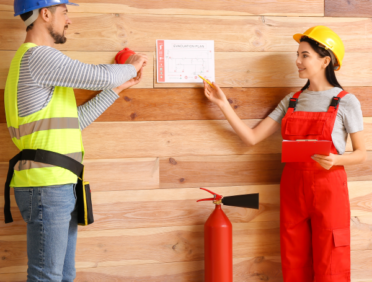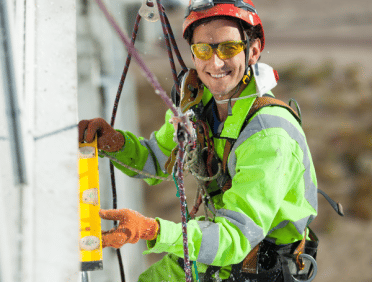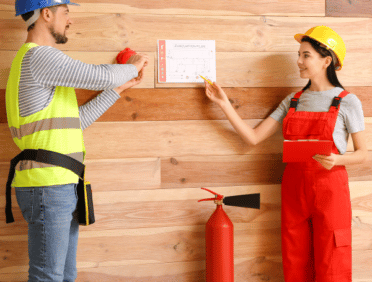The importance of fire safety in the UK workplace
One of the things about fire safety is that it is something that many people simply don’t think will happen to them in their workplace. However, it is just the type of thing that can occur at any time and even more so if you don’t think about the key aspects of protecting your building and keeping those in it safe.
Fire safety is designed to highlight the main risk factors when it comes to the likelihood of a fire developing in the workplace, not just how to deal with it if it were to happen. This is just one of the reasons why fire safety is something that every business should have on their health and safety radar.
The roles of fire marshals and fire wardens in ensuring fire safety
In every workplace, there should be someone who is identified as a fire marshal or a fire warden. They are the person who has responsibility for workplace fire safety, this includes implementing any fire safety practices and ensuring that the health and safety of the occupants in the premises, either staff or visitors is protected.
Fire marshals are prepared to deal with any fire emergency, although their main aim should always be to ensure that everyone in the building is evacuated so that there is no risk of them being harmed.
Understanding Fire Safety Regulations in the UK
One key part of fire safety is making sure that the fire safety regulations in the UK are understood and that they can be followed. These give all the necessary guidance and information that is going to be needed to ensure that the people who are responsible for fire safety in the workplace know what is expected of them and what they need to do to be safe.
The Regulatory Reform (Fire Safety) Order 2005
Before the Regulatory Reform (Fire Safety) Order of 2005, several pieces of different legislation covered fire safety in the UK. This made it far more confusing to follow what needed to be done than necessary; therefore it was decided that it would be best to bring together these legislation and focus on providing all the guidance needed in one.
This is how the Regulatory Reform (Fire Safety) Order of 2005 was created.
The Order gives a fire safety standard that should be seen as the minimum required for non-domestic premises.
The legal obligations for fire safety in workplaces
The Order outlines some legal obligations for fire safety in the workplace. These include:
Undertaking fire risk assessments to identify key risk factors that can be associated with fire on the premises
Maintaining general fire safety precautions to minimise the risk of fires occurring
Understanding the Order and what is expected of those who are designated to be in control of fire safety in that workplace
The importance of designated personnel for fire safety roles
Part of the Order is ensuring that there are people or a person in the workplace who is responsible for fire safety. They need to be trained to a high level on what is needed to protect against fire and what to do if a fire should start in the workplace.
These people will be responsible for not only their safety, but also the safety of everyone on the premises, be that employees or visitors/customers.
The Role of Fire Marshals
When it comes to fire safety in the workplace two main roles will have responsibilities for those people within the building. The first is fire marshals. But what are fire marshals and what is expected of them within this role?
Definition and primary responsibilities of a fire marshal
The main responsibility of a fire marshal will be to guide people out of a building safely should there be a fire emergency alert. They should know all about the fire evacuation procedure for your workplace and be aware of what is needed to make sure that everyone is safe.
They should also be aware of how to raise the alarm and ensure that the right processes are followed. They will also need to check the building when the evacuation is complete, to ensure that no one is left behind.
It is also important for fire marshal’s to be aware of the key aspects of fire prevention too, so that they can be mindful when something in the workplace could be deemed as a risk.
Training requirements and qualifications for fire marshals
To be recognised as a fire marshal, the person will need to receive fire marshal training. This is usually a four-hour course that is completed and assessed with a multiple-choice assessment.
If you complete and pass this course, then you will be provided with a fire marshal certificate which will be valid for three years before you need to sit a new training course, be that the entire course again, or a shorter, refresher course if this is appropriate and available.
Fire evacuation procedures and emergency response responsibilities
The fire marshal should be aware of what to do in a fire emergency. They should know the fire evacuation procedure, which includes how to ensure everyone is safely guided out of the building and also to ensure that the right meeting points are identified.
Fire marshals should be aware of what to do to raise the alarm that a fire has been detected, or that is possible that there is a fire on the premises.
Liaison with emergency services and conducting fire drills
When the emergency services arrive, the fire marshal should be able to liaise with the emergency services to let them know of the situation and identify any potential risks that may be within the premises.
Another key aspect of being a fire marshal is conducting fire drills, treating them as if they were real fire situations and ensuring that they use these drills as a way to practice the key aspects of fire evacuation and fire emergency procedures.
The Role of Fire Wardens
Whilst a fire marshal will deal with the evacuation of the building during a fire, the fire warden takes on more of a preventative role within fire safety. Here are some of the key aspects of the role of a fire warden.
Definition and primary responsibilities of a fire warden
A fire warden is a person who has the responsibility to assist with implementing necessary fire safety arrangements within a workplace. These arrangements will often be identified by the manager or owner, with the fire warden in an advisory role, ensuring that everyone within the building is safe from a variety of potential fire risks.
Coordination of fire safety efforts within specific areas or departments
Fire wardens will work across the entire building, liaising with and coordinating fire safety efforts to ensure that everyone is safe. They will be aware of specific areas within the building and whether or not they have a higher risk of fire than others.
They will work with a variety of departments, ensuring that each one knows their own relevant fire evacuation procedure and can ensure that this is met when the need arises. They will be able to answer any concerns or questions that the team members may have and give guidance where needed.
Regular inspections and maintenance of fire safety equipment
Another key aspect of a fire warden’s role is to ensure that the fire safety equipment within the building is safe to use. They should inspect it regularly and check for any potential faults or issues that need to be addressed.
If there is any need for maintenance, then the fire warden should be aware of how to do this or be able to liaise with the relevant experts to ensure that this maintenance is properly carried out.
Assisting in risk assessments and identifying potential fire hazards
Risk assessments should be carried out by the person responsible for the overall health and safety of the workplace, however, if this person is not also the fire warden, then they should ask for the fire warden to help them with this process.
The fire warden should be able to identify potential fire hazards and liaise with the health and safety manager to ensure that the changes that need to be made for this to be mitigated are taken.
Key Differences and Overlapping Responsibilities
Whilst there are some key differences between the roles of fire marshal and fire warden, there are also some of their responsibilities that overlap. This means that both of the roles may take on this aspect of fire safety, or work together to ensure that the responsibility is met.
A comparative analysis of the roles of fire marshals and fire wardens
Fire wardens and fire marshals both are concerned with fire safety within a workplace. This means that they are there to protect those who are in the building and ensure that the risk of fire is reduced too.
The two roles do have some differences which means that it is easy enough to identify between the two.
Fire wardens are there to take a more proactive role towards fire safety. They are responsible for carrying out risk assessments to identify key areas of possible fire risk. They make sure that the equipment that is needed is properly checked and maintained so that it can be used should it be needed.
In comparison, fire marshals are more reactive. They are there in the event of a fire, they will take charge of raising the alarm, ensuring the evacuation happens and that the people within the building are safe and then liaising with the fire emergency service during the emergency too.
Instances where their responsibilities intersect
Fire wardens will often be on hand to help with evacuations during an emergency. They will also be there during fire drills and will often liaise with the fire marshals to ensure that they are aware that the fire drill is coming up.
Fire marshals and fire wardens will work together if any key pieces of legislation that relate to fire safety changes, making sure that their procedures within the workplace are going to cover the key aspects of these changes and change the way that fire safety is approached if needed.
Importance of clear communication and collaboration between the roles
Fire safety is vitally important in any workplace, however, in order for it to work the way that it should there needs to be clear communication and collaboration between those two important fire safety roles.
They need to work together to ensure that all the policies and procedures that relate to fire safety in the building are understood and followed and that fire safety is always something that is focused on, each and every day.
Ensuring Compliance with UK Fire Safety Regulations
One key aspect of being either a fire marshal or a fire warden is ensuring that there is compliance with UK Fire Safety Regulations.
The importance of adhering to fire safety laws
Fire safety laws are there to ensure that everyone is protected from fire in a workplace or non-residential building. It covers a variety of aspects of fire safety, from the preventative measures that can stop fires from developing, or spreading if they do start and also the reactive measures that are needed should a fire be identified and the alarm be raised.
When these things work together they can help to ensure that everyone in a building is protected from fire and that the risk to human life and damage to the property and whatever is within it, is reduced as much as possible.
Role of fire marshals and fire wardens in maintaining compliance
Some of the work that fire marshals and fire wardens take on as a part of their role relates to compliance with the fire safety regulations and ensuring that they are met.
They should carry out fire risk assessments on a regular basis, and definitely, if the workplace conditions change. They should be aware of their own fire evacuation routes and the procedures that need to be followed when a fire is identified, these should always be with a focus on the safety of those in the building.
They also need to ensure that the fire evacuation signs and the equipment that could be used to fight fires in some situations are working and are stored and labelled in the right way.
One of the main things that these roles need to ensure that they do is be aware of the Order and the relevant regulations, this will then allow them to be aware of what is expected of them and be able to make changes that relate to any of the key changes within the regulations.
Consequences of negligence in fire safety duties
The main reason to focus on fire safety is that it helps to keep people’s lives protected, however, it is worth noting that there are also some key consequences of negligence in the fire safety duties.
If you do not comply with the fire safety regulations then you are going to put your company stripped of their licenses that relate to fire safety, they could lose their premises and if the breaches were serious enough there can even be a risk of prison sentences.
The distinct roles and responsibilities of fire marshals and fire wardens
We have already looked at some of the key differences between fire marshals and fire wardens. Both of these roles require the person or people to be focused on the safety of the people within the workplace when it comes to the possible chance of fire.
Fire marshals take a more reactive approach to fire safety. They are there in the instances when a fire may occur and will ensure that everyone in the building is evacuated properly and that everyone is safe.
Fire wardens often take a more proactive approach to fire safety. They ensure that the polices and procedures are followed and that the required equipment is safe to use. Both roles are vitally important and there are many times when they may overlap they can often be performed by one singular person if there is a lack of people in the workplace.
Collaborative efforts in safeguarding workplaces
The important thing to remember about fire safety should be the responsibility of everyone in a workplace. Whilst not every employee will need to have the same level of training when it comes to fire safety, everyone will need to be aware of the basics of fire safety.
The more people who are aware of fire safety, then the better chance that there will be that the premises and everyone within them, will be protected.
Training and Education for Fire Safety Personnel
For fire safety personnel to be able to do their additional role or responsibility appropriately they are going to need to have the right level of training and education to enable them to do their best.
Fire safety training programmes are available in the UK
Within the UK there are a variety of fire safety training programmes that are available. These can be online courses or they can be taken in work. There are also outside companies that offer a range of fire safety courses that are designed to provide those responsible for fire safety in a workplace with all the information that they need to be able to do their role to the best of their ability.
Tailored training for fire marshals and fire wardens
Fire marshals and fire wardens are often confused as being in the same role. Whilst there are some key similarities in these roles and what they are responsible for, there are also some differences that should be highlighted too.
This means that it is important to try and offer tailored training for both fire marshals and fire wardens. These training courses can cover some of the key aspects of both of these roles and ensures that the responsibilities are understood and followed so that the people within the workplace are kept as safe as possible.
Benefits of ongoing education and skill development
When it comes to fire safety, initial training is always important, but you should never overlook how vital it is to continue to develop these skills. Without regular practice and refreshers, it can sometimes lead to the person forgetting what it is that they need to do in the case of an emergency. Not only this but when the situation is high pressure, they can also find that they panic and they are not sure what to do.
This is why it is important to ensure that skills continue to be developed over time, this could come in the form of refresher training, reading up on the latest guidance and news, or even better, carrying out fire drills and practices to help the people in charge to remember what is expected of them in these situations.
Prioritise proper fire safety training and designation of roles
It can be all too easy to overlook fire safety training as one of those tick boxes that you need to have, but when you consider what the outcome could be if proper fire safety measures are not followed, then it makes sense to try and ensure that this training is given enough time.
When responsible people are aware of the importance of their role and are given the right information to enable them to do the work required, then this can make things all the better for your workplace and the safety of the people in it.
Fire Safety Training
The Regulatory Reform (Fire Safety) Order 2005 (commonly referred to as the Fire Safety Order) requires that employers and building owners ensure that their employees and relevant persons (such as tenants or visitors) are provided with adequate fire safety training.
Learn Q offer a Fire Safety course that is ideal for the majority of employees and other relevant visitors are fully trained and your business is covered, priced at just £20 per learner.
Alternatively, you can save even more with our money saving bundles, which are ideal for large and smaller businesses, such as:
- COSHH and Fire Safety Training Package | £18.74 | includes COSHH Awareness and Fire Safety
- First Aid and Fire Safety Training Package | £17.51 | includes Emergency First Aid at Work and Fire Safety
- First Aid, COSHH and Fire Safety Bundle | £26.24 | includes Emergency First Aid at Work, COSHH Awareness and Fire Safety
- Health and Safety 5 Course Bundle | £40 | includes Fire Safety, Health and Safety at Work, Display Screen Equipment (DSE) Awareness, Slips, Trips and Falls and RIDDOR (Reporting of Injuries, Diseases and Dangerous Occurrences Regulations) Awareness courses
- Health and Safety at Work 7 Course Training Package | £61.25 | includes Fire Safety, Health and Safety at Work, Display Screen Equipment (DSE) Awareness, Emergency First Aid at Work, COSHH Awareness, Manual Handling and Mental Health: Workplace courses
- Health and Safety in Business Training Package | £33.74 | includes Emergency First Aid at Work, COSHH Awareness, Health and Safety at Work and Fire Safety courses
- Health and Safety in Catering Training Package | £34.99 | includes Emergency First Aid at Work, COSHH Awareness, HACCP Awareness and Fire Safety courses












